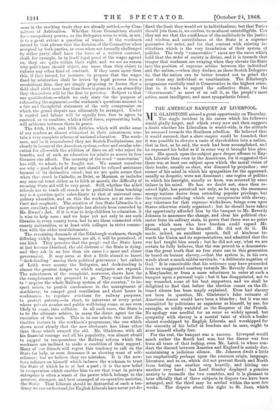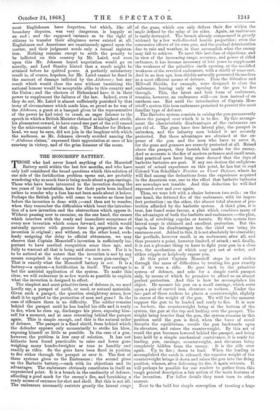THE AMERICAN BANQUET AT LIVERPOOL.
111. GLADSTONE missed a great opportunity on Thursday. I1 n The single incident in his career which his followers would gladly forget, and which every now and then suggests a doubt whether his Liberalism is world-wide, is the attitude he assumed towards the Southern rebellion. He believed that it would succeed, that a slave empire could be founded, that it was possible to elevate a caste of slaveholders into a nation. that in fact, as he said, the work had been accomplished, and he expressed his belief as if in some way it brought him plea- sure. His speech upon the subject gave deeper offence to Eng- lish Liberals than even to the Americans, for it suggested that there was at least one subject upon which the moral vision of their leader, usually so clear, was dimmed by prejudice ; one corner of his mind in which his sympathies for the oppressed, usually so despotic, were not dominant ; one region of politics in which his foresight, usually so keen, was arrested by some failure in his mind. He has, we doubt not, since then re- ceived light, has perceived not only, as he says, the enormous energy nations derive from extending popular privilege, but the enormous suffering which any compromise with slavery, any tolerance for that supreme wickedness, brings even upon States otherwise wisely organized ; but he should have taken the opportunity afforded him by the banquet to Mr. Reverdy Johnson to announce the change, and clear his political cha- racter from its solitary stain, to prove that there was no point upon which men who love freedom could regard Mr. Disraeli as superior to himself. He did not do it. He made, indeed, an excellent speech, full of kindness to- wards the Union and its representatives, and admitted that the war had taught him much ; but he did not say, what we are certain he fully believes, that the war proved to a demonstra- tion the great truth that no free state can in this generation be based on human slavery,—that the system is, in his own words about a much milder servitude, "a deliberate negation of God." It is conceivable that his reticence may have proceeded from an exaggerated courtesy towards Mr. Reverdy Johnson as a Marylander, or from a mere reluctance to enter at such a banquet upon a personal topic ; but it has disappointed, not to say wounded, some of his best supporters, and we shall be delighted to find that before the election comes on the ill- timed silence has been amply explained. Even had slavery not been in question, Mr. Gladstone's false estimate of American forces would have been a blunder ; but it was one committed by politicians as sagacious as himself, by one, for example, as coldly watchful as the Emperor of the French. No apology was needful for an error so widely spread, but sympathy with slavery is a mental taint of which a leader almost worshipped by English Liberals, and worshipped for the sincerity of his belief in freedom and in man, ought to avow himself wholly free.
For the rest, the banquet was a success. Liverpool would much rather the South had won, but the dinner was free from all trace of that feeling, even Mr. Laird, to whose con- duct the discord between America and England is mainly due, maintaining a judicious silence. Mr. Johnson dwelt a little too emphatically perhaps upon the common origin, language, literature, and so on, which did not prevent South and North from hating one another very heartily, and hitting one another very hard ; but Lord Stanley displayed a genuine anxiety to reconcile the two countries, and it is pleasant to hear officially that of three subjects in dispute two have been arranged, and the third may be settled within the next few weeks. The dispute about the right to St. Juan, which most Englishmen have forgotten, but which, like all boundary disputes, was very dangerous, is happily at an end ; and the supposed variance as to the right of citizens to transfer their allegiance never existed at all. Englishmen and Americans are unanimously agreed upon the matter, and their judgment needs only a formal registra- tion. Nothing remains except to settle the penalty to be inflicted on this country by Mr. Laird, and even upon this Mr. Johnson hoped negotiation would go on merrily, and Lord Stanley hinted that a result might be attained before he quitted power. A perfectly satisfactory result is, of course, hopeless, for Mr. Laird cannot be fined in the amount of damage inflicted by the Alabama; but any result which would close the sore without tarnishing the national honour would be acceptable alike to this country and the Union ; and the electors of Birkenhead have it in their power to supplement the failures of the law. Indeed, even if they do not, Mr. Laird is almost sufficiently punished by that irony of circumstance which made him, so proud as he was of the Alabama, a guest at a banquet given to the representative of the power he had tried to crush, an eager listener to the speech in which a British Minister claimed as his highest credit, his pleasantest reward, to have cured one part of the evil caused by the achievements of that ship. The Member for Birken- head, we may be sure, did not join in the laughter with which the audience, as Mr. Johnson cleverly avoided naming the " Alabama claims," expressed their appreciation at once of his courtesy in victory, and of the grim humour of the scene.



































 Previous page
Previous page